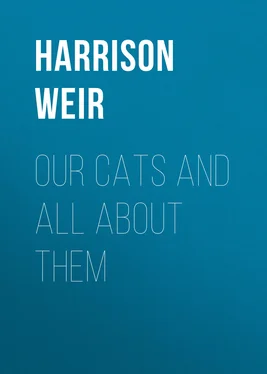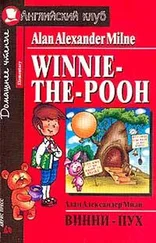Harrison Weir - Our Cats and All About Them
Здесь есть возможность читать онлайн «Harrison Weir - Our Cats and All About Them» — ознакомительный отрывок электронной книги совершенно бесплатно, а после прочтения отрывка купить полную версию. В некоторых случаях можно слушать аудио, скачать через торрент в формате fb2 и присутствует краткое содержание. Жанр: foreign_antique, Биология, Биология, Домашние животные, foreign_edu, на английском языке. Описание произведения, (предисловие) а так же отзывы посетителей доступны на портале библиотеки ЛибКат.
- Название:Our Cats and All About Them
- Автор:
- Жанр:
- Год:неизвестен
- ISBN:нет данных
- Рейтинг книги:4 / 5. Голосов: 1
-
Избранное:Добавить в избранное
- Отзывы:
-
Ваша оценка:
- 80
- 1
- 2
- 3
- 4
- 5
Our Cats and All About Them: краткое содержание, описание и аннотация
Предлагаем к чтению аннотацию, описание, краткое содержание или предисловие (зависит от того, что написал сам автор книги «Our Cats and All About Them»). Если вы не нашли необходимую информацию о книге — напишите в комментариях, мы постараемся отыскать её.
Our Cats and All About Them — читать онлайн ознакомительный отрывок
Ниже представлен текст книги, разбитый по страницам. Система сохранения места последней прочитанной страницы, позволяет с удобством читать онлайн бесплатно книгу «Our Cats and All About Them», без необходимости каждый раз заново искать на чём Вы остановились. Поставьте закладку, и сможете в любой момент перейти на страницу, на которой закончили чтение.
Интервал:
Закладка:
The cat is not only a very useful animal about the house and premises, but is also ornamental. It is lithe and beautiful in form, and graceful in action. Of course there are cats that are ugly by comparison with others, both in form, colour, and markings; and as there are now cat shows, at which prizes are offered for varieties, I will endeavour to give, in succeeding chapters, the points of excellence as regards form, colour, and markings required and most esteemed for the different classes. I am the more induced to define these as clearly as possible, owing to the number of mistakes that often occur in the entries.
LONG-HAIRED CATS
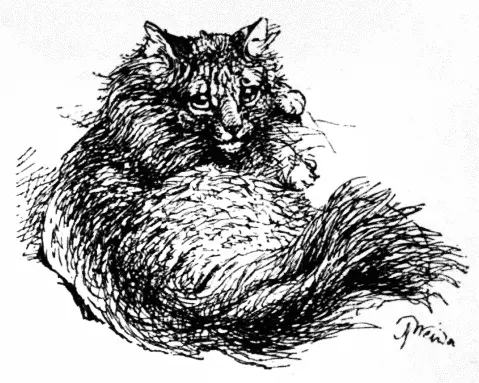
These are very diversified, both in form, colour, and the quality of the hair, which in some is more woolly than in others; and they vary also in the shape and length of the tail, the ears, and size of eyes. There are several varieties—the Russian, the Angora, the Persian, and Indian. Forty or fifty years ago they used all to be called French cats, as they were mostly imported from Paris—more particularly the white, which were then the fashion, and, if I remember rightly, they, as a rule, were larger than those of the present day. Coloured long-haired cats were then rare, and but little cared for or appreciated. The pure white, with long silky hair, bedecked with blue or rose-colour ribbon, or a silver collar with its name inscribed thereon or one of scarlet leather studded with brass, might often be seen stretching its full lazy length on luxurious woollen rugs—the valued, pampered pets of "West End" life.
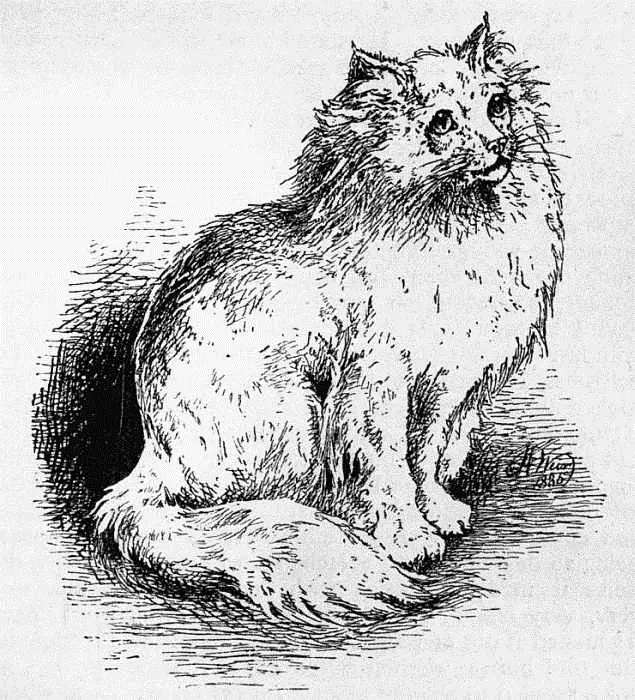
A curious fact relating to the white cat of not only the long but also the short-haired breed is their deafness. Should they have blue eyes, which is the fancy colour, these are nearly always deaf; although I have seen specimens whose hearing was as perfect as that of any other colour. Still deafness in white cats is not always confined to those with blue eyes, as I too well know from purchasing a very fine male at the Crystal Palace Show some few years since. The price was low and the cat "a beauty," both in form, coat, and tail, his eyes were yellow, and he had a nice, meek, mild, expressive face. I stopped and looked at him, as he much took my fancy. He stared at me wistfully, with something like melancholy in the gaze of his amber -coloured eyes. I put my hand through the bars of the cage. He purred, licked my hand, rubbed against the wires, put his tail up, as much as to say, "See, here is a beautiful tail; am I not a lovely cat?" "Yes," thought I, "a very nice cat." When I looked at my catalogue and saw the low price, "something is wrong here," said I, musingly. "Yes, there must be something wrong. The price is misstated, or there is something not right about this cat." No! it was a beauty—so comely, so loving, so gentle—so very gentle. "Well," said I to myself, "if there is no misstatement of price, I will buy this cat," and, with a parting survey of its excellences, I went to the office of the show manager. He looked at the letter of entry. No; the price was quite right—"two guineas!" "I will buy it," said I. And so I did; but at two guineas I bought it dearly. Yes! very dearly, for when I got it home I found it was "stone" deaf. What an unhappy cat it was! If shut out of the dining-room you could hear its cry for admission all over the house; being so deaf the poor wretched creature never knew the noise it made. I often wish that it had so known—very, very often. I am satisfied that a tithe would have frightened it out of its life. And so loving, so affectionate. But, oh! horror, when it called out as it sat on my lap, its voice seemed to acquire at least ten cat power . And when, if it lost sight of me in the garden, its voice rose to the occasion, I feel confident it might have been heard miles off. Alas! he never knew what that agonised sound was like, but I did, and I have never forgotten it, and I never shall. I named him "The Colonel" on account of his commanding voice.
One morning a friend came—blessed be that day—and after dinner he saw "the beauty." "What a lovely cat!" said he. "Yes," said I, "he is very beautiful, quite a picture." After a while he said, looking at "Pussy" warming himself before the fire, "I think I never saw one I liked more." "Indeed," said I, "if you really think so, I will give it to you; but he has a fault—he is 'stone' deaf." "Oh, I don't mind that," said he. He took him away—miles and miles away. I was glad it was so many miles away for two reasons. One was I feared he might come back, and the other that his voice might come resounding on the still night air. But he never came back nor a sound.—A few days after he left "to better himself," a letter came saying, would I wish to have him back? They liked it very much, all but its voice. "No," I wrote, "no, you are very kind, no, thank you; give him to any one you please—do what you will with 'the beauty,' but it must not return, never." When next I saw my friend, I asked him how "the beauty" was. "You dreadful man!" said he; "why, that cat nearly drove us all mad—I never heard anything like it." "Nor I," said I, sententiously. "Well," said my friend, "'all is well that ends well;' I have given it to a very deaf old lady, and so both are happy." "Very, I trust," said I.
The foregoing is by way of advice; in buying a white cat—or, in fact, any other—ascertain for a certainty that it is not deaf .
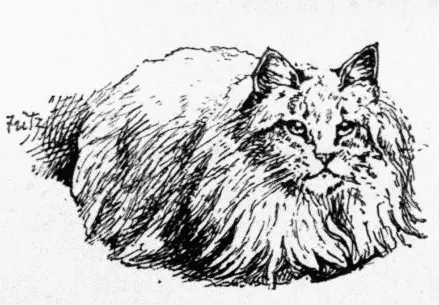
A short time since I saw a white Persian cat with deep blue eyes sitting at the door of a tobacconist's, at the corner of the Haymarket, London. On inquiry I found that the cat could hear perfectly, and was in no way deficient of health and strength; and this is by no means a solitary instance.
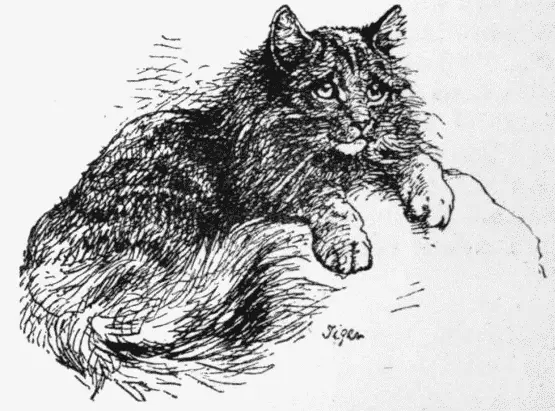
MISS SAUNDERS' "TIGER."
THE ANGORA
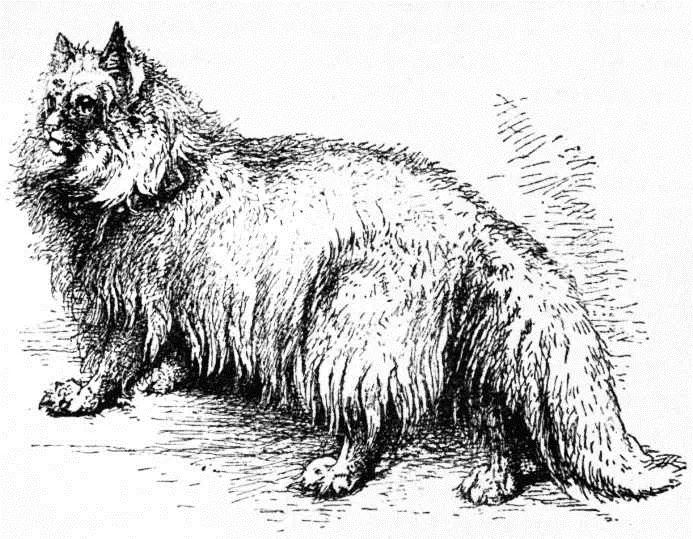
The Angora cat, as its name indicates, comes from Angora, in Western Asia, a province that is also celebrated for its goats with long hair, which is of extremely fine quality. It is said that this deteriorates when the animal leaves that locality. This may be so, but that I have no means of proving; yet, if so, do the Angora cats also deteriorate in the silky qualities of their fur? Or does it get shorter? Certain it is that many of the imported cats have finer and longer hair than those bred in this country; but when are the latter true bred? Even some a little cross-bred will often have long hair, but not of the texture as regards length and silkiness which is to be noted in the pure breed. The Angora cats, I am told, are great favourites with the Turks and Armenians, and the best are of high value, a pure white, with blue eyes, being thought the perfection of cats, all other points being good, and its hearing by no means defective. The points are a small head, with not too long a nose, large full eyes of a colour in harmony with that of its fur, ears rather large than small and pointed, with a tuft of hair at the apex, the size not showing, as they are deeply set in the long hair on the forehead, with a very full flowing mane about the head and neck; this latter should not be short, neither the body, which should be long, graceful, and elegant, and covered with long, silky hair, with a slight admixture of woolliness; in this it differs from the Persian, and the longer the better. In texture it should be as fine as possible, and also not so woolly as that of the Russian; still it is more inclined to be so than the Persian. The legs to be of moderate length, and in proportion to the body; the tail long, and slightly curving upward towards the end. The hair should be very long at the base, less so toward the tip. When perfect, it is an extremely beautiful and elegant object, and no wonder that it has become a pet among the Orientals. The colours are varied; but the black which should have orange eyes, as should also the slate colours, and blues, and the white are the most esteemed, though the soft slates, blues, and the light fawns, deep reds, and mottled grays are shades of colour that blend well with the Eastern furniture and other surroundings. There are also light grays, and what is termed smoke colour; a beauty was shown at Brighton which was white with black tips to the hair, the white being scarcely visible, unless the hair was parted; this tinting had a marvellous effect. I have never seen imported strong-coloured tabbies of this breed, nor do I believe such are true Angoras. Fine specimens are even now rare in this country, and are extremely valuable. In manners and temper they are quiet, sociable, and docile, though given to roaming, especially in the country, where I have seen them far from their homes, hunting the hedgerows more like dogs than cats; nor do they appear to possess the keen intelligence of the short-haired European cat. They are not new to us, being mentioned by writers nearly a hundred years ago, if not more. I well remember white specimens of uncommon size on sale in Leadenhall Market, more than forty years since; the price usually was five guineas, though some of rare excellence would realise double that sum.
Читать дальшеИнтервал:
Закладка:
Похожие книги на «Our Cats and All About Them»
Представляем Вашему вниманию похожие книги на «Our Cats and All About Them» списком для выбора. Мы отобрали схожую по названию и смыслу литературу в надежде предоставить читателям больше вариантов отыскать новые, интересные, ещё непрочитанные произведения.
Обсуждение, отзывы о книге «Our Cats and All About Them» и просто собственные мнения читателей. Оставьте ваши комментарии, напишите, что Вы думаете о произведении, его смысле или главных героях. Укажите что конкретно понравилось, а что нет, и почему Вы так считаете.
